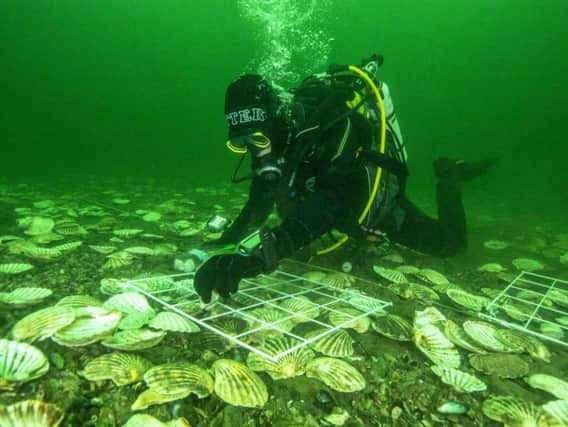Glenmorangie hosts Edinburgh event to revive Europe's oysters


The Scotch whisky producer, alongside organisations including Scottish Natural Heritage, will host the second Native Oyster Restoration Alliance (Nora) conference, opening today in Edinburgh.
The conference brings together guests from across Europe to develop a “blueprint” for native oyster reef restoration, building on – and possibly replicating – work already being conducted in Scotland.
Advertisement
Hide AdAdvertisement
Hide AdIn a European first, the whisky company and its partners Heriot-Watt University and the Marine Conservation Society began restoring extinct reefs to the protected Dornoch Firth, next to the Glenmorangie distillery, in 2017.
The Dornoch Environmental Enhancement Project (Deep) has returned 20,000 oysters, supplied by farmers across Scotland, to the Dornoch Firth, where the molluscs are thought to have thrived for at least 8,000 years before being destroyed by overfishing in the 19th century.
Based on a successful outcome of this trial, scientists will increase oyster numbers to 200,000 by 2021.
Deep aims to establish a self-sustaining reef of four million oysters by 2025 and it is hoped that the Scottish oyster industry could position itself to supply the 50 million oysters needed for all of Europe’s existing reef restoration projects.
Plans could later lead to millions of native oysters being returned to the seas around the UK, Sweden, France, Germany, the Netherlands, Belgium, Italy and Croatia.
Glenmorangie said it is “dedicated to protecting and improving” the Highland surroundings in which it has been based for 175 years.
Established reefs in the Dornoch Firth would improve water quality and biodiversity, acting in tandem with Glenmorangie’s anaerobic digestion plant to purify the by-products of distillation. The company claims this would be an environmental first for a distillery.
Marine scientists, conservationists, administrators and oyster producers from across Europe will attend the landmark three-day conference on reef restoration at the Royal Society of Edinburgh from today.
Advertisement
Hide AdAdvertisement
Hide AdBill Sanderson, Deep’s research director and associate professor of marine biodiversity at Heriot-Watt, who is chairing the Nora conference said this is “a game-changing moment for marine conservation”.
Glenmorangie president and chief executive Tom Moradpour said: “We are incredibly proud to be pioneering Deep’s vital environmental work with our partners, not only protecting but enhancing Glenmorangie distillery’s environment for future generations.”
Henning von Nordheim, head of the marine conservation department in Germany’s Federal Conservation Agency, added: “There is a real chance to restore large areas of our over exploited marine ecosystems with native oysters, for the benefit of marine biodiversity and sea water purification all around Europe.
“In doing so we can learn a lot from each other at this gathering in Edinburgh.”